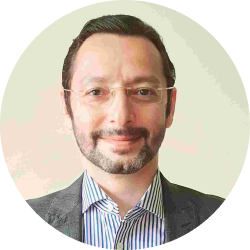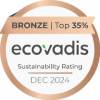A great interview is a shared responsibility between the interviewer and the interviewee. It’s not a one-sided interrogation, but rather a joint effort to find mutual compatibility. The interviewer’s role is to craft questions that uncover the candidate’s skills and mindset, while the interviewee holds all the power to showcase their capabilities. Clarity and engagement from both sides create an environment for genuine communication.
In short, an interview is a dialogue, not a monologue.
You, as the interviewer, play a crucial role in setting the stage. With a well-thought-out list of questions, you guide the candidate through different facets of their professional journey. To make your life a little easier, we’ve compiled 20 key interview questions to help assess whether a candidate aligns well with your organization.
Explore and bookmark the ones you want for your next interview!
Basic Questions
These interview questions will set the tone for a constructive conversation. Starting with basic questions will break the ice and help you make a connection with the candidate. Plus, it will lighten up the atmosphere for the candidate to feel comfortable and share more information without fear of judgment.
1. How did you hear about the role?
Asking this question in an interview is crucial for several reasons. Firstly, it provides valuable insights about the effectiveness of your recruitment channels. Understanding where candidates discover your job openings will help you assess the reach and impact of your advertising efforts, allowing you to optimize and allocate resources to the most successful channels.
This interview question also helps gauge the candidate’s genuine interest and proactiveness. If they learned about the role through an indirect channel such as their network, industry events, or employee referrals, it indicates a proactive approach to staying informed and connected within their field. While answering, the candidate might also share their initial perception of the company and the role.
2. Why did you apply for this role?
You want employees who resonate with your vision, not people who are just doing a job. This question helps you filter motivated folks from the ones who will just be there. Ask this question to understand their motivation. Tell them to explain what made them hit the apply button.
While answering this question the candidate will talk through various points that’ll provide valuable insights into their understanding of the role and their ability to align their skills and experiences with the job requirements. Getting to know their motivations for applying will allow you to assess the level of genuine interest and passion for the role and the company. It will aid in identifying candidates who have a strong connection with the job and are likely to be more engaged, committed, and driven to excel in their responsibilities.
3. Why should we hire you?
It’s important, as an employer, to know what value a candidate will bring to the organization. Don’t look for specific and properly laid out answers here, but expect the candidate to know their worth. A confident individual is aware of their strengths and won’t shy away from answering this question.
But remember – this is a tricky question that can intimidate some. It would be better to park it for the end of the interview when the candidate is more comfortable talking to you.
You can look for three key information points here:
- Confidence in what they are saying
- Clarity with which they articulate
- Candidates with a lot of ‘me’ and ‘I’ in their answers can be a red flag. Look for ‘we’, ‘my team’, ‘all of us’ while they talk about their past experiences
4. Do you have any questions for us?
It’s your responsibility as an interviewer to ensure the candidate feels good about themselves during the course of conversation. Don’t just bombard them with questions one after another. Ask them if they have any doubts or questions for you. This gesture has several benefits for you as an employer:
- It demonstrates a commitment to fostering open and transparent communication in the organization.
- It encourages candidates to actively engage in the interview process, providing them an opportunity to seek clarifications and gather additional information.
- It gives you a sneak peak into the candidate’s preparedness and genuine interest in the role and the company.
The answer to this question will help you tailor the discussion to meet the candidate’s needs, ultimately contributing to a more effective and insightful interview process.
Perfect your talent sourcing with community outreach, DE&I events, employee referrals, and more.
Make Successful Talent Sourcing a Reality!
Culture Fit Questions
Culture fit interview questions ensure that a candidate not only has the right skills but also fits well with your team. These questions explore aspects of workplace harmony – asking about preferred work environments, management styles, and an understanding of company culture. It helps uncover if they’ll gel well with your team’s beat, fostering a positive and collaborative atmosphere for both personal and organizational success.
5. What type of work environment do you prefer?
The aim of this question is straightforward; to assess if the candidate will fit in the company’s working environment. The candidate you’re interviewing can be extremely skilled and dynamic, but if they do not resonate with the company’s style of operating, they won’t be a great-fit.
It is extremely important to know about a candidate’s preferences, understanding whether they thrive in collaborative, fast-paced, or autonomous work settings helps assess their alignment with the dynamics of the existing team.
It’s worth noting that individuals can adjust, and past experiences should not be the sole basis for evaluation. If a candidate’s current work approach differs from what you want, have an open discussion about their willingness to adapt. This conversation will enable more informed hiring decisions, fostering a productive workplace environment for the selected candidate.
6. What’s your management style?
This question holds value when interviewing for senior roles that require team management skills. It is also an important question for roles that might have to manage people after a short while.
Leaders play a pivotal role in ensuring that the company culture sustains, and a bad leader can affect an entire team. It’s important to gain a deep understanding of the candidate’s leadership approach to keep the values of your organization intact. Recognizing that a poor leader can significantly impact an entire team, this question delves into a candidate’s ability to inspire, guide, and foster collaboration. It evaluates their capacity to align management practices with organizational values, ensuring a positive influence on team dynamics and overall workplace culture.
The answer to this question will ensure the selected individual not only manages teams effectively but also contributes positively to the overall organizational culture and success.
7. What do you know about our company culture, and why do you think you would fit in?
This is an insightful question to gauge the genuine interest and suitability of a candidate for the role and the organization. Everyone is expected to come well-researched for an interview and if a candidate cannot come up with anything for this question, it might indicate a lack of sincerity.
The candidate’s answer to this question will help you know:
- Candidate’s genuine interest
- Candidate’s self-awareness
- Candidate’s long-term commitment
8. What did you not like about your last role or organization?
You need to know what are the deal-breakers for someone who might be a part of your company. This interview question will let you in on the candidate’s dislikes and discomforts. It’s not about dwelling on negativity but gaining insights into their workstyle. This question will help you see if the candidate’s interests align with aspects of the new role and workplace. It’s like checking if the puzzle pieces fit, ensuring a better match between the candidate and the job.
The answer provides a glimpse into the candidate’s expectations and helps you see if the new role addresses those concerns for a smooth integration into the team.
Behavioral Questions
Behavioral interview questions take you on a journey through a candidate’s past experiences. These questions dig into real-life scenarios, asking candidates to share stories about how they handled challenges, resolved conflicts, or achieved successes in their previous roles. These questions reveal adaptability and interpersonal skills, providing a sneak peek into how they might navigate the challenges of your workplace.
9. Describe an instance when something didn’t go according to plan.
Let’s be real, no one is perfect. We are human beings and making mistakes is a part of the process. The important thing is what we do next. This question should be included to see if the candidate is self aware and humble enough to share their mistakes with you.
Encourage them to share what happened and emphasize more on what they did afterwards to ensure things got resolved.
If they share a valuable lesson they learnt, consider it a green flag but if they start playing a blame game, maybe a red flag. Ownership, irrespective of the role or position, is an integral part of a candidate’s work ethic and should be prioritized.
10. What would your former colleagues say about you if you weren’t in the room?
You are not looking for self-promotion from the candidate – the aim of this question is to get a balanced answer. Now what’s a balanced answer? Well, it is the one that neither sounds like bragging nor self deprecation. Something like ‘My colleagues would say I take my work seriously and try to take initiatives to improve myself and they think I am fun to be around’.
This question will help you understand how a candidate is perceived by others and if they can acknowledge both their strengths and areas for improvement. It’s like looking for the real, unfiltered scoop on how the candidate collaborates and contributes to a team.
11. How do you handle stress and pressure?
Your objective as an interviewer is to know whether the candidate holds the fort or crumbles down when things don’t work out. There are multiple things happening simultaneously in any given organization. Projects or tasks don’t move as per initial plans in a lot of cases, perhaps due to a difference in opinions, a shift in priorities, some unforeseen issue, the list can go on. It’s important for an employee to analyze the situation and move towards a solution instead of panicking.
Ask this question to the candidate to see what they think of crisis management and evaluate their emotional intelligence.
This might be a difficult question but don’t dismiss this. Look for real-life examples in the answer. It can be anything starting from a crystal clear to-do list, to proactive communication, and a mindfulness practice to help deal with stress.
12. What are you passionate about?
A candidate is a real person who will dedicate a substantial portion of their daily life to the organization. Understanding the individual behind the professional sphere is important too. This question is a great way to find out what the candidate enjoys outside of work.
Please know that this may not impact their work directly but it will help you dive a bit into their personality. Plus, it will give them a break from the usual interview questions and help them talk freely about their lives. It’s always great to talk and know people for who they really are.
Situational Questions
Situational interview questions tend to pose hypothetical scenarios to the candidate that let you assess a candidate’s decision-making skills. Instead of focusing on their past experiences, these questions transport candidates into the future, asking how they would handle specific challenges or scenarios on the job.These questions help you assess a candidate’s problem-solving abilities, strategic thinking, and how well they can apply their knowledge to real-world situations, giving you valuable insights into their potential performance in the role.
13. What would your first 30, 60, or 90 days look like in this role?
Nobody comes in and transforms the organization on their first day. An individual naturally integrates into a new environment over time. Try to understand if the candidate has a framework to help them get settled in a new environment. You can ask them to break down their answer for more clarity.
Strong candidates will outline the necessary steps to feel comfortable with the team and work. Remember: you’re not looking for properly laid Excel sheets with action items here. You are trying to understand the candidate’s vision and practicality.
14. How would you manage a project with a tight deadline?
This question requires careful handling, as it might give the candidate the impression that the role entails more responsibilities than a typical position. Build some context and pose a situation that is rare but demands focus and time management.
You are asking this question to get an idea of their approach towards resource allocation, delegation, and task management when faced with time constraints. The response will give you a practical understanding of their project management style and whether it aligns with the organization’s expectations and values.
Overall, discussion around tight deadlines brings out the candidate’s take on resilience, adaptability, and efficiency; all crucial factors for succeeding in any role.
15. How would you handle a difficult client or customer?
You may have a defined company culture and expect employees to abide by the norms, but your clients and customers will have their own working style and ethics. You can’t expect them to follow your approach.
Asking this question will help you understand the candidate’s interpersonal and communication skills, which are crucial when dealing with external people. Handling a client or a customer is not always a cakewalk – it’s a nuanced task that requires people skills. Great communication, interpersonal skills, and the ability to remain composed and professional under pressure are all aspects of successfully handling a client or a customer. Dealing with difficult clients often requires a strategic and diplomatic approach, and the candidate’s response will offer a glimpse into their tactics for calming tense situations and finding satisfactory resolutions. It also reveals their capacity for empathy and customer-centric thinking.
16. What would you do if you were asked to perform a task you have never done before?
Asking this question is like testing a candidate’s adaptability superpower. It’s not about having all the answers, but how they approach the unknown. This question helps the interviewer understand if the candidate is open to learning and problem-solving.
Any role demands learning skills on the job, and the candidate’s answer will tell you if they will shy away from new tasks or will be open to exciting challenges. It’ll give insight into the candidate’s mindset – whether they embrace learning and growth or prefer to stay in their comfort zone. It’s a key question to ensure you’re hiring someone who’s ready for the dynamic twists and turns of the job.
Get insight into the latest talent sourcing and recruitment advertising benchmarks across 16 of the top professions in the US.
Recruitment Benchmarks for Top 16 Professions!
Skill-Oriented Questions
Skill-oriented questions in an interview focus mainly on a candidate’s unique abilities and talents. These questions zoom in on specific skills related to the job. It’s a bit like asking, “Show me what you’ve got!” These questions help employers understand not just what skills a candidate possesses, but also how they plan to apply and enhance those skills in the role. This guides the conversation towards a detailed exploration of the candidate’s capabilities, ensuring a perfect match between their skill set and the demands of the position.
17. How do your skills align with this role?
While the candidate’s resume outlines their skillset, discussing it during an interview provides a more vivid illustration of their abilities. Asking this question will encourage the candidate to be more specific about their capabilities and past experiences. This discussion will help you understand whether they have gone through your job description carefully. Moreover, it will also help you identify any skill gaps.
Through this question the candidate has an opportunity to share a holistic understanding of the role they’re interviewing for. And, as an employer, you get access to targeted information to facilitate more in-depth discussion for better hiring decisions.
18. What are your key professional strengths and weaknesses?
We’re living in a world that’s dominated by skills. You want to hire people who know what their strengths are so they will fit well in your organization. You also want people who acknowledge their skill gaps so you can work together for mutual growth.
Look for strengths and weaknesses that directly impact the role you’re interviewing for. Answers coupled with relevant examples would be even better.
19. What skills are you looking to develop in your next job?
The role that you’re interviewing for might have more demands in the coming months. For this reason, you should always try to understand the aspirations and future plans of a candidate.
Get them talking about how they see themselves growing in this role, ask them about their plans for self-improvement.
By understanding the skills a candidate wishes to cultivate, you gain valuable information on their potential contributions to the team. You can align these aspirations with the organization’s objectives. Plus, it sparks a conversation about mutual growth, creating a collaborative atmosphere where both the candidate and the company can thrive together.
20. What do you do when someone challenges/discards your ideas at work?
Your job as an interviewer is to assess a candidate’s overall personality. The success of a hire is dependent on a perfect balance of hard/technical skills and soft skills.
This question will give you a picture of a candidate’s soft skills. Their response will unveil their approach to conflict resolution, collaboration, and maintaining a positive work environment. Understanding how candidates tackle such situations ensures that the chosen individual not only possesses the necessary hard skills but also contributes positively to team dynamics, fostering a peaceful workplace conducive to task accomplishment within deadlines.
Conclusion
When it comes to recruitment, planning a successful interview is like solving a puzzle where each question leads to the discovery of the perfect candidate. It’s not just the candidate who needs preparation before an interview – an interviewer needs to be equally prepared with a list of well thought out questions for fair evaluation.
But, having a predefined set of questions should not stop you from engaging in an altogether different conversation. Preparing in advance is a good practice, although it may not always translate seamlessly into real-world situations. Remember to rephrase the question as per the ongoing conversation. Another important aspect is customization; tweak the questions for each role. It’s not about a one-size-fits-all approach but rather a bespoke strategy that brings out the best in every candidate.
See us in action to boost your company’s productivity. Follow us on Twitter and LinkedIn for more hiring insights!














